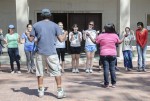UCLA students ran, jumped and giggled as they played a variety of elementary school games on Saturday afternoon.
The games were part of a workshop for the tutors of the Watts Tutorial Program, which serves low-income elementary to high school students within the Watts and William Mead areas of Los Angeles.
This year, the program has among the highest participation rates of the past decade, said Mayu Watanabe, a third-year sociology student and executive director of the Watts Tutorial Program.
The program has been on the UCLA campus since the early 1990s and works with 70 student tutors and about the same number of students. The students from around Watts and William Mead take a bus to the UCLA campus on Wednesday evenings to take part in the program.
Recently, the program has teamed up with with two other organizations, Playworks and Edubase, to improve the way it conducts its scheduled playtime.
Unstructured playtime posed problems within the Watts Tutorial Program, said Nick Nieto, a second-year pre-business economics student and co-founder of Edubase who worked as a tutor last year. Edubase helps pair up nonprofits with college students and organizations.
“You have a bunch of really energetic kids, and no playground – that would sometimes lead them into getting into arguments and on the worst days, getting into fights,” he said.
Nieto said he recognized an opportunity to partner Playworks with the Watts Tutorial Program to teach tutors games and strategies to integrate organized, inclusive activities to help alleviate difficult-to-manage behavior.
Playworks institutes full-time, trained adults in elementary schools to run recess and after-school programs with a similar play program model. The program only applies to schools where 50 percent or more of students receive free or reduced lunch. Playworks adapted its program for the Watts Tutorial Program because the student group has no equipment.
LaTasha Golden, a program manager for Playworks, said her favorite part of the Playworks model is the chance to change elementary school culture.
“We’re not just transforming how recess works, but we are transforming the whole community culture to make it more positive,” Golden said.
One specific way Golden tries to make recess more inclusive is by breaking down gender barriers that prevent girls from participating in athletic activities.
“I want to make girls feel OK being active,” she said. “Playworks teaches (the children) that everyone can participate in sports whether you’re a girl or a boy, in second grade or fifth grade. It’s all about inclusion.”
Nieto said he thinks the collaboration between the two programs is exciting because nonprofits are not always able to connect with college students and organizations, and therefore underutilize the resources college campuses have to offer.
“There is no better group to interface with than college students – I can tell you that a number of the people in the program through the partnership we developed with Playworks will be lifelong supports of the program,” Nieto said.
Watts Tutorial Program incorporates an hour of tutoring, a 30-minute nutritional dinner, and concludes with 30 to 45 minutes of play on Wednesday evenings.
On Saturday, as the tutors played the games developed by Playworks, everyone was involved. The group ran around the court of Young Hall to find partners for the latest icebreaker game.
At the end of one game, Golden asked the group of tutors what their favorite – and most challenging – part of working with kids was.
Many members agreed it is difficult to determine their role as a mentor when they need to discipline a tutee. But the kids’ imagination and creativity keep the mentors motivated.
When the student return to the UCLA campus Wednesday, Watanabe said she looks forward to introducing the games developed with Playworks.
